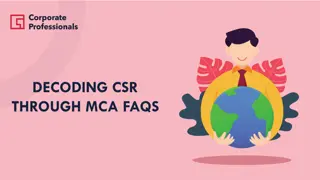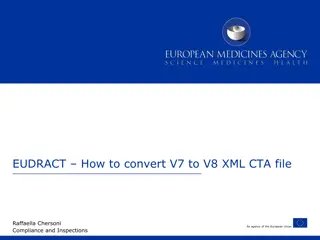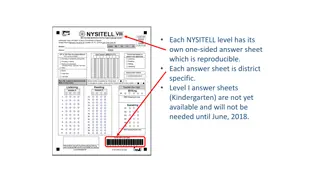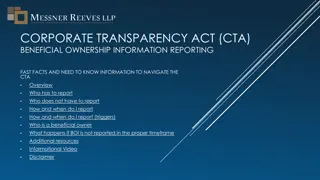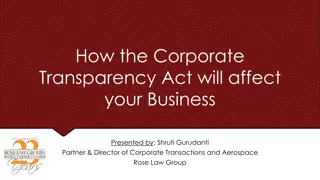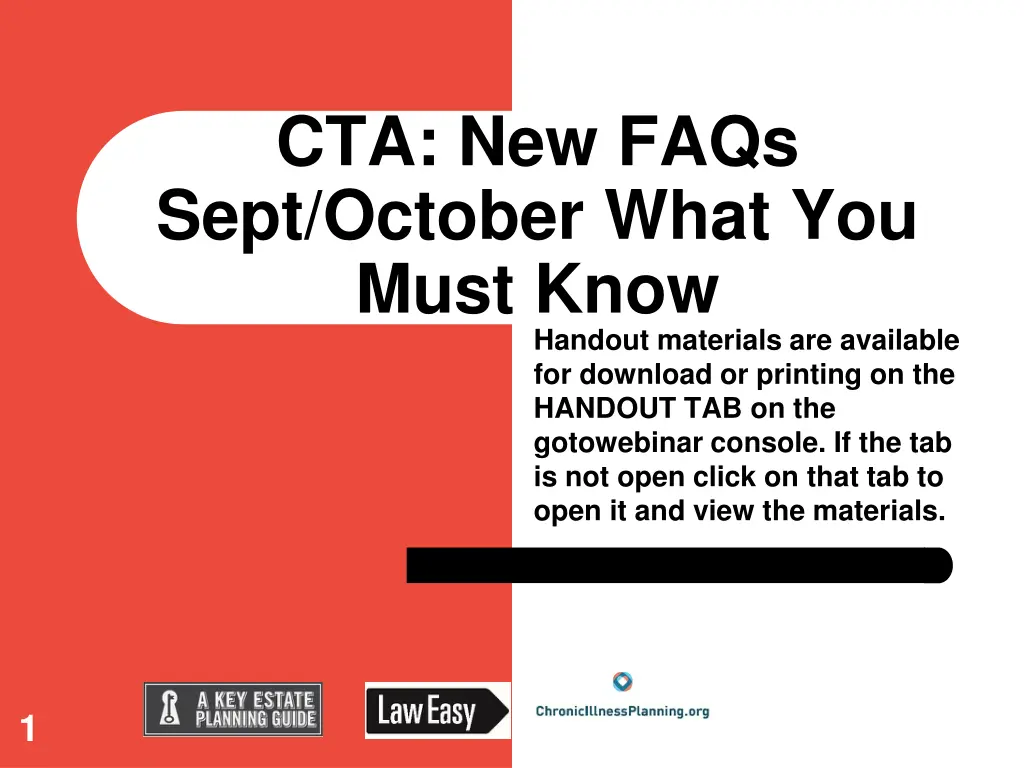
Understanding New FAQs for September/October: Important Information You Need to Know
Explore the latest FAQs for September/October providing essential insights on beneficial ownership reporting, legal considerations, and webinar guidelines. Download handout materials for comprehensive details. Disclaimer: Information shared is for educational purposes only.
Download Presentation

Please find below an Image/Link to download the presentation.
The content on the website is provided AS IS for your information and personal use only. It may not be sold, licensed, or shared on other websites without obtaining consent from the author. If you encounter any issues during the download, it is possible that the publisher has removed the file from their server.
You are allowed to download the files provided on this website for personal or commercial use, subject to the condition that they are used lawfully. All files are the property of their respective owners.
The content on the website is provided AS IS for your information and personal use only. It may not be sold, licensed, or shared on other websites without obtaining consent from the author.
E N D
Presentation Transcript
CTA: New FAQs Sept/October What You Must Know Handout materials are available for download or printing on the HANDOUT TAB on the gotowebinar console. If the tab is not open click on that tab to open it and view the materials. 1
CTA: New FAQs Sept/October What You Must Know By: Martin M. Shenkman, and Alan Gassman 2
Color Code FAQs numbers are highlighted in yellow. FAQ text is in blue text to facilitate discussion. Comments on FAQs are green text to differentiate them from the actual text of the FAQs. 3
Some Webinar Pointers All programs hosted by Shenkman Law are free and we focus on providing colleagues with practical and actionable planning ideas. Our goal is to help you, our colleagues, with your practice. The PowerPoint is available for download from the web console during the program. A recording of this program and the materials will be posted to www.shenkmanlaw.com/webinars within about a week of the program. There is a growing library of 150+ webinar recordings there. There is a growing library of 200+ video planning clips on www.laweasy.com. There is no CLE or CPE for this program, but the webinar system will send you a certificate of attendance. We cannot control those certificates, so if there is an issue, we cannot assist. If you have questions, please email the panel. All emails are listed near the end of the slide deck. 4
General Disclaimer The information and/or the materials provided as part of this program are intended and provided solely for informational and educational purposes. None of the information and/or materials provided as part of this PowerPoint or ancillary materials are intended to be, nor should they be construed to be, the basis of any investment, legal, tax, or other professional advice. Under no circumstances should the audio, PowerPoint, or other materials be considered to be, or used as independent legal, tax, investment, or other professional advice. The discussions are general in nature and not person-specific. Laws vary by state and are subject to constant change. Economic developments could dramatically alter the illustrations or recommendations offered in the program or materials. 5
CTA New FAQs September 18, 2024 6
C. 14. If a reporting company created or registered in 2024 or later winds up its affairs and ceases to exist before its initial BOI report is due to FinCEN, is the company still required to submit that initial report? Yes. Reporting companies created or registered in 2024, no matter how quickly they cease to exist thereafter, must report their beneficial ownership information to FinCEN within 90 days of receiving actual or public notice of creation or registration. Reporting companies created or registered in 2025 or later, no matter how quickly they cease to exist thereafter, must report their beneficial ownership information to FinCEN within 30 days of receiving actual or public notice of creation or registration. These obligations remain applicable to reporting companies that cease to exist as legal entities meaning wound up their affairs, ceased conducting business, and entirely completed the process of formally and irrevocably dissolving before the expiration of the 30- or 90-day period reporting companies have to report their beneficial ownership information to FinCEN. If a reporting company files an initial beneficial ownership information report and then ceases to exist before the expiration of the 30- or 90-day period reporting companies have to report their beneficial ownership information to FinCEN, then there is no requirement for the reporting company to file an additional report with FinCEN noting that the company has ceased to exist. [Updated September 10, 2024] 7
C. 15. Who may file a BOI report on behalf of a reporting company created or registered in 2024 or later that ceases to exist before its initial BOI report is due to FinCEN? Anyone whom a reporting company authorizes to act on its behalf such as an employee, owner, or third-party service provider may file a BOI report on the reporting company s behalf, even after the reporting company ceases to exist (see Question B.8). Thus, if a reporting company will cease to exist before the expiration of the 30- or 90-day period reporting companies have to report their beneficial ownership information to FinCEN, then it should make arrangements while it exists to have the report submitted on its behalf, even if the requisite filing does not occur until after the reporting company ceases to exist. Regardless, the BOI report must be filed by the time such report is due to FinCEN (see Question C.14). #How does a dissolved company authorize anyone to do anything? How can it pay advisers for guidance/help? 8 [Issued September 10, 2024]
G. 4. Should an initial BOI report include historical beneficial owners of a reporting company, or only beneficial owners as of the time of filing? Except as noted below, an initial BOI report should only include the beneficial owners as of the time of the filing. Reporting companies should notify FinCEN of changes to beneficial owners and related BOI through updated reports. If a reporting company created or registered in 2024 or later ceases to exist before the expiration of the 30- or 90-day period reporting companies have to report their beneficial ownership information to FinCEN, but no one submits the reporting company s initial beneficial ownership information report to FinCEN until after the reporting company ceases to exist, then that beneficial ownership information report should reflect the beneficial ownership information accurate as of the moment prior to the reporting company ceasing to exist. FinCEN s Small Entity Compliance Guide includes more information about when to file updated or corrected BOI reports in Chapter 6, What if there are changes to or inaccuracies in reported information? [Updated September 10, 2024] 9
CTA New FAQs October 3, 2024 10
A. 3. Under the Corporate Transparency Act, who can access beneficial ownership information? In accordance with the Corporate Transparency Act, FinCEN may permit access to beneficial ownership information to: Federal agencies engaged in national security, intelligence, or law enforcement activity; State, local, and Tribal law enforcement agencies with court authorization; Officials at the Department of the Treasury; Foreign law enforcement agencies, judges, prosecutors, and other authorities that submit a request through a U.S. Federal agency to obtain beneficial ownership information for authorized activities related to national security, intelligence, and law enforcement; Financial institutions with customer due diligence requirements under applicable law (in order to facilitate compliance with those requirements); and Federal functional regulators or other appropriate regulatory agencies that supervise or assess financial institutions with access to beneficial ownership information (in order to supervise such financial institutions compliance with customer due diligence requirements). 11
A. 3. Under the Corporate Transparency Act, who can access beneficial ownership information? FinCEN published the rule that will govern access to and protection of beneficial ownership information on December 22, 2023. Beneficial ownership information reported to FinCEN is stored in a secure, non-public database using rigorous information security methods and controls typically used in the Federal government to protect non-classified yet sensitive information systems at the highest security level. FinCEN will continue to work closely with those authorized to access beneficial ownership information to ensure that they understand their roles and responsibilities in using the reported information only for authorized purposes and handling in a way that protects its security and confidentiality. [Updated October 3, 2024] 12
A. 6. Is beneficial ownership information reported to FinCEN accessible under the Freedom of Information Act (FOIA)? No. Beneficial ownership information reported to FinCEN is exempt from disclosure under the Freedom of Information Act (FOIA). [Issued October 3, 2024] While the restrictions on access are appropriate and should be reassuring many people are worried about inadvertent disclosures or hacks and that will upset many people grappling with the reporting requirements. 13
B. 7. Is a reporting company required to use an attorney, certified public accountant, enrolled agent, or other service provider to submit beneficial ownership information to FinCEN? No. FinCEN expects that many, if not most, reporting companies will be able to submit their beneficial ownership information to FinCEN on their own using the guidance FinCEN has issued. This is a misconception. Many clients are intimidated by the CTA and for any advisers who have tried to study the reporting requirements they are dense, voluminous and often not intuitive or reasonable. Many clients will not be comfortable with the CTA filing and will not be able to figure out what to do. Reporting companies that need help meeting their reporting obligations can consult with professional service providers, such as lawyers, accountants, or enrolled agents. Not necessarily. CPAs and enrolled agents face unauthorized practice of law ( UPL ) issues. Only 3 states: IA, MD and NJ have issued guidance and that guidance varies dramatically. Wealth advisers often try to educate clients and they face UPL issues and are not even mentioned by FinCEN. FinCEN has no say in UPL issues, state Courts do. [Updated October 3, 2024] 14
B. 8. Who can file a BOI report on behalf of a reporting company, and what information will be collected on filers? Anyone a reporting company authorizes to act on its behalf such as an employee, owner, or third-party service provider may file a BOI report on the reporting company s behalf. What is required for a Reporting Company to authorize a person to file? If not authorized is the filing invalid? See FAQ N.4. that seems to suggest nothing is required. Inconsistent? When submitting the BOI report, individual filers should be prepared to provide basic contact information about themselves, including their name and email address. The person filing the BOI report, including a third-party service provider, must certify on behalf of the reporting company that the information is true, correct, and complete. (See Question C.15 regarding who can file a BOI report for a reporting company that ceases to exist before its initial BOI report is due to FinCEN.) #What liability exposure does this create for the filer? [Updated October 3, 2024] 15
B. 9. If a third-party service provider who is not an attorney submits a reporting company s beneficial ownership information to FinCEN, has that provider engaged in the unauthorized practice of law? Nothing in the Corporate Transparency Act or FinCEN s regulations prevents a third-party service provider who is not an attorney from submitting a reporting company s beneficial ownership information (if authorized by the company to do so) or otherwise assisting a reporting company with preparing or submitting a BOI report. Whether an action qualifies as the unauthorized practice of law, however, is generally determined by state law, and thus may vary. #It does vary, dramatically, and only 3 states have provided guidance. FinCEN is ignoring a significant issue that affects the ability of filers to get the necessary guidance. [Issued October 3, 2024] 16
B. 10. How do I report multiple beneficial owners or company applicants on one report? When completing the beneficial ownership information (BOI) report in a PDF, you can add company applicants or beneficial owners by using the + button next to the relevant Section title: When completing the BOI report online rather than as a PDF, you can add company applicants or beneficial owners by using the Add Company Applicant or Add Beneficial Owner button in the relevant Section title: [Issued October 3, 2024] 17
C. 17. Reporting companies are created (or, if a foreign company, registered to do business) in the United States by filing a document with a secretary of state or similar office. What government offices are similar offices to a secretary of state for this purpose? A similar office is any office (including a department, agency, or bureau) of a governmental authority under the law of a State or Indian Tribe where or through which a domestic entity files a document to be created or a foreign entity files a document to be registered to do business in the United States. Federal agencies are not similar offices. Domestic entities that are created by State or Federal charter are not created by the filing of a document with a secretary of state or similar office. [Issued October 3, 2024] 18
C. 18. Does a conversion from one corporate type to another (e.g., LLC to corporation) create a new domestic reporting company that must file an initial beneficial ownership information report with FinCEN? A domestic reporting company is an entity created by the filing of a document with a secretary of state or any similar office under the law of a State or Indian Tribe. Depending on the law of the State or Indian Tribe, and the type of entity undergoing a conversion, a conversion filing may result in the creation of a new domestic reporting company. Where a conversion does result in the creation of a new domestic reporting company, the new domestic reporting company is required to file an initial beneficial ownership information (BOI) report. Even if a conversion filing does not create a new domestic reporting company, a reporting company that undergoes such a conversion may nonetheless be required to submit anupdatedBOI report to FinCEN after the conversion. For example, if Company, Inc. converted to an LLC, its name may have changed to Company, LLC, and thus it may be required to file an updated BOI report because the name change is a change to required information previously submitted to FinCEN. Practically, what is a new entity under state law? How is that determined? A conversion will almost assuredly have a name change so reporting will almost assuredly be required. 19
C. 18. Does a conversion from one corporate type to another (e.g., LLC to corporation) create a new domestic reporting company that must file an initial beneficial ownership information report with FinCEN? Reporting companies are also required to report their jurisdiction of formation. This is the jurisdiction where the reporting company was originally created. If a reporting company changes its jurisdiction of formation (for example, by ceasing to be a corporation incorporated under California law and becoming instead a corporation incorporated under Texas law), it must submit an updated BOI report to FinCEN. [Issued October 3, 2024] 20
C. 19. Does a reporting company need to file a beneficial ownership information report each time it registers to do business in a different state? No. Reporting companies must file initial beneficial ownership information (BOI) reports within certain timeframes. For example, a reporting company created (if domestic) or registered to do business (if foreign) in the United States on or after January 1, 2024, must file an initial BOI report after it has received actual notice that its creation or registration has become effective or the date on which a secretary of state or similar office first provides public notice, such as through a publicly accessible registry, that the reporting company has been created or registered. A reporting company does not need to file additional BOI reports in connection with subsequent filings with secretaries of state or similar offices that merely: (1) authorize a domestic reporting company that already exists under the laws of one State or Tribe to do business under the laws of another State or Tribe; or (2) authorize a foreign reporting company that is already registered under the laws of one State or Tribe to do business under the laws of another State or Tribe. [Issued October 3, 2024] 21
D.1.i. How many beneficial owners can a reporting company have? An individual might be a beneficial owner through substantial control, ownership interests, or both. A reporting company can have multiple beneficial owners; there is no maximum number of beneficial owners who must be reported. #This is part of the complexity and problem with compliance. Anyone who passes the ownership or substantial control tests must report and that may be a large number of people. In a modern irrevocable trust there may easily be five+ different people. So, and LLC owned by 4 trusts may have 20 people filing, and that is not counting company applicants that formed the LLC or the persons filing on behalf of each BOI. [Issued October 3, 2024] 22
D.1.ii. What if a reporting company does not have any individuals who own or control at least 25 percent? FinCEN expects that every reporting company will be substantially controlled by one or more individuals, and therefore that every reporting company will be able to identify and report at least one beneficial owner to FinCEN. [Issued October 3, 2024] 23
D. 2. What is substantial control? An individual can exercise substantial control over a reporting company in four different ways. If the individual falls into any of the categories below, the individual is exercising substantial control: The individual is a senior officer (the company s president, chief financial officer, general counsel, chief executive officer, chief operating officer, or any other officer who performs a similar function). The individual has authority to appoint or remove certain officers or a majority of directors (or similar body) of the reporting company. A similar body may mean the manager(s) of an LLC, etc. The individual is an important decision-maker for the reporting company. See Question D.3 for more information. How vague and all encompassing is this concept? How many people might fall into this definition? The individual has any other form of substantial control over the reporting company as explained further in FinCEN s Small Entity Compliance Guide (see Chapter 2.1, What is substantial control? ). How vague and all encompassing is this concept? How many people might fall into this definition? [Updated October 3, 2024] 24
D. 18. If one spouse has an ownership interest in a reporting company, is the other spouse also considered a beneficial owner if the reporting company is created or registered in a community property state? Possibly. Whether State community property laws affect a beneficial ownership determination will depend upon the specific consequences of applying applicable State law. If, applying community property State law, both spouses own or control at least 25 percent of the ownership interests of a reporting company, then both spouses should be reported to FinCEN as beneficial owners unless an exception applies. Many of the critical issues for CTA reporting decisions depend on state law. Non-lawyers should view any analysis of state law as a red-flag for possible unauthorized practice of law issues. The above might require every community spouse to file based on ownership if either community spouse owns 25%+ or perhaps if the 2 community spouses collectively own 25%. Is it worth trying to argue around the broad reading of this to avoid the filing? That would not seem to implicate the community spouse if the other spouse has substantial control. [Issued October 3, 2024] 25
F.5.i. What is an example of a non-expired identification document issued by a U.S. State or local government, or Indian Tribe ? A non-expired identification document issued by a U.S. State or local government, or Indian Tribe is a document issued by such authorities specifically for use as proof of the holder s identity. Such documents typically, but not always, include a photograph of the holder (see Question F.10). For example, a non-expired identification card issued by a State s Department of Corrections for the purpose of identifying a currently or previously incarcerated individual is an acceptable identification document. This is distinct from personal documents that serve functions other than use as proof of a holder s identity, such as recording a birth (a birth certificate ) or granting the holder access to particular government services (e.g., a library card ). Does this help our understanding of what is required? [Issued October 3, 2024] 26
F.5. ii. Is a U.S. passport card an acceptable form of identification? Yes. With respect to Item 3 of the above list, a U.S. passport card is considered a type of passport issued by the U.S. government, and a non-expired U.S. passport card is therefore an acceptable form of identification. Did anyone doubt this? Does this help our understanding? [Issued October 3, 2024] 27
F. 12. What address should a reporting company report if it lacks a principal place of business in the United States? If a reporting company does not have a principal place of business in the United States, then the company must report to FinCEN as its address the primary location in the United States where it conducts business. If a reporting company has no principal place of business in the United States and conducts business at more than one location within the United States, then the reporting company may report as its primary location the address of any of those locations where the reporting company receives important correspondence. 28
F. 12. What address should a reporting company report if it lacks a principal place of business in the United States? If a reporting company has no principal place of business in the United States and does not generally conduct business functions at any location in the United States, then its primary location is the address in the United States of the person that the reporting company, under State or other applicable law, has designated to accept service of legal process on its behalf. In some jurisdictions, this person is referred to as the reporting company s registered agent, or the address is referred to as the registered office. Such a reporting company should report this address to FinCEN as its address. FinCEN will understand the use of such an address to mean that: (i) the registered agent or other person at the address designated to accept service of legal process has consented to the use of its address in this capacity, and (ii) the reporting company does not generally conduct business functions at any other location in the United States. 29 [Updated October 3, 2024]
F. 14. Are reporting companies required to report the addresses of beneficial owners or company applicants that participate in an Address Confidentiality Program (ACP)? FinCEN is mindful of the critical privacy interests protected by ACPs. Reporting companies that are required to report a beneficial owner or company applicant registered with a State s ACP should report to FinCEN the ACP address that the State provided to the individual. As a best practice, individuals registered with a State ACP may consider retaining documentation to demonstrate that they participate in an ACP. [Issued October 3, 2024] 30
F. 15. For each beneficial owner or company applicant a company is required to report, the company must provide an identifying number from an acceptable identification document as well as an image of the identification document used to obtain this identifying number. Does the name on an individual s acceptable identification document need to match the individual s current full legal name? No. If the name on the identification document of a beneficial owner or company applicant does not match their current full legal name due to a recent legal name change, the individual s current full legal name should be reported to FinCEN. The individual may report an acceptable identifying document that does not include the updated full legal name. This also applies when an individual is requesting a FinCEN identifier. If the requester obtains a new driver s license or other acceptable identifying document that includes a changed name, address, or identifying number, the requester should update the information already provided to FinCEN, either by filing an updated beneficial ownership information report or updating the previously filed FinCEN identifier information, including by submitting an image of the new identification document. See Question F.5 What are acceptable forms of identification that will meet the reporting requirement? for a list of the acceptable forms of identification [Issued October 3, 2024] 31
L.3.i. If a reporting companys ownership interests are controlled or wholly owned, directly or indirectly, by more than one exempt entity, do the entities need to be affiliated to qualify for the subsidiary exemption? No. If a reporting company s ownership interests are controlled or wholly owned by more than one exempt entity, the reporting company may still qualify for the subsidiary exemption if the entities are unaffiliated; however, every controlling or owning entity must itself be an exempt entity in order for the reporting company to qualify for the subsidiary exemption. i. [Issued October 3, 2024] 32
L. 6. Does a subsidiary whose ownership interests are partially controlled by an exempt entity and partially controlled by a non-exempt entity qualify for the subsidiary exemption? No. If an exempt entity controls some but not all of the ownership interests of the subsidiary and any of remaining interests are controlled by a non-exempt entity or by an individual, the subsidiary does not qualify for the subsidiary exemption. To qualify, a subsidiary s ownership interests must be fully, 100 percent owned or controlled by one or more entities from the list of exempt entities identified in Question L.3. In cases involving more than one exempt parent entity, the subsidiary exemption applies even if the subsidiary s parent entities are exempt from the BOI reporting requirements for different reasons (e.g., one parent is an exempt large operating company and the other is an exempt public utility) so long as all of the subsidiary s ownership interests are owned or controlled by listed exempt entities. In this context, control of ownership interests means that the exempt entity or entities entirely control all of the ownership interests in the reporting company, in the same way that an exempt entity or entities must wholly own all of a subsidiary s ownership interests for the exemption to apply. 33 [Updated October 3, 2024]
L. 10. Would a reporting company qualify for the pooled investment vehicle (PIV) exemption (Exemption # 18) if it is operated or advised by an exempt reporting adviser (ERA)? The pooled investment vehicle (PIV) exemption from the beneficial ownership information reporting requirements only applies to PIVs operated or advised by certain types of entities. One of these types of entities is an investment adviser registered with the Securities and Exchange Commission (SEC) under the Investment Company Act of 1940 or the Investment Advisers Act of 1940. Thus, an adviser, including an exempt reporting adviser (ERA), that is not registered with SEC would not qualify as this type of entity. A PIV is also exempt, however, if it is operated or advised by a venture capital fund adviser, i.e., an entity that is both described in section 203(l) of the Investment Advisers Act of 1940 (15 U.S.C. 80b-3(l)) and has filed Item 10, Schedule A, and Schedule B of Part 1A of Form ADV (or any successor thereto) with the SEC. PIVs operated by ERAs meeting these venture capital fund adviser criteria are exempt from the beneficial ownership information (BOI) reporting requirements. PIVs operated by ERAs that rely on another exemption from registration with the SEC under the Investment Advisers Act are not thereby exempt from the BOI reporting requirements. [Issued October 3, 2024] 34
L. 11. Does a reporting company qualify for the large operating company exemption if it is run from a personal residence? It depends. To qualify for the large operating company exemption, an entity must [1] have more than 20 full time employees in the United States, [2] must have filed a Federal income tax or information return in the United States in the previous year demonstrating more than $5,000,000 in gross receipts or sales, and [3] must have an operating presence at a physical office in the United States. The term operating presence at a physical office within the United States means that an entity regularly conducts its business at a physical location in the United States that the entity owns or leases and that is physically distinct from the place of business of any other unaffiliated entity. The definition does not preclude residences from being such a physical office. However, the entity that qualifies for the relevant exemption must itself lease (or own) the physical location, regularly conduct business at that location, and the location must be physically distinct from the place of business of any other unaffiliated entity. Thus, if the company is run from a personal residence, the company must itself actually rent or own the space in the personal residence that it uses to qualify for the large operating company exemption. 35 [Issued October 3, 2024]
M. 2. How can I use a FinCEN identifier? When a beneficial owner or company applicant has obtained a FinCEN identifier, reporting companies may report the FinCEN identifier of that individual in the place of that individual s otherwise required personal information on a beneficial ownership information report. An individual who is both a beneficial owner and a company applicant will receive only one FinCEN identifier. A reporting company may report another entity s FinCEN identifier and full legal name in place of information about its beneficial owners when three conditions are met: (1) the other entity obtains a FinCEN identifier and provides it to the reporting company; (2) the beneficial owners hold interests in the reporting company through ownership interests in the other entity; and (3) the beneficial owners of the reporting company and the other entity are the exact same individuals. [Updated October 3, 2024] 36
M.5.i. Does a reporting company need to update its BOI report if a beneficial owner or company applicant updates the information associated with their individual FinCEN identifier? No. When information for a FinCEN identifier is updated, the BOI reports where that FinCEN identifier appears are automatically updated. When a reporting company provides an individual s FinCEN identifier for a company applicant or beneficial owner on its BOI report, the Beneficial Ownership IT system automatically links that BOI report to the information provided by the individual when they obtained the identifier, as well as any updates made by the individual to that information. Having every BOI obtain a FinCEN Identifier for this reason seems to be the prudent way to handle all filings. [Issued October 3, 2024] 37
N. 4. Are third-party service providers required to maintain records validating that they are authorized to file on behalf of a reporting company? FinCEN does not require third-party service providers to maintain any specific record validating that they are authorized to file on behalf of a reporting company. A third-party filer who willfully files a false or fraudulent beneficial ownership information (BOI) report with FinCEN, however, may be subject to civiland criminal penalties. As a best practice, a third-party filer thus may want to consider maintaining documentary records relevant to BOI reports filed on behalf of reporting companies. See FAQ B.8 which seems inconsistent. [Issued October 3, 2024] 38
Conclusion and Additional Information More Guidance 39
Conclusion FinCEN continues to issue ongoing FAQs. While these are intended to make filing more understandable, many of them nonetheless add additional complexity and highlight the highly nuanced nature of many CTA filing decisions. Practitioners and filers should all be careful and continually review all updated and new guidance. 40





